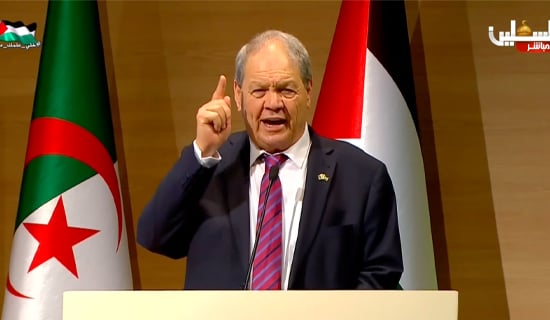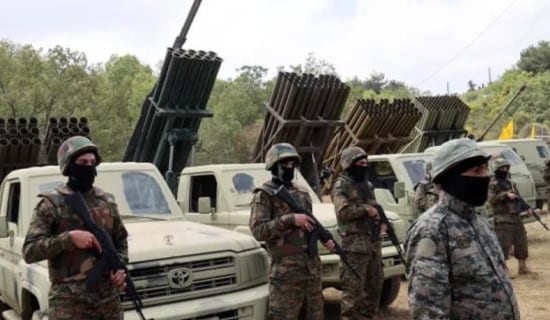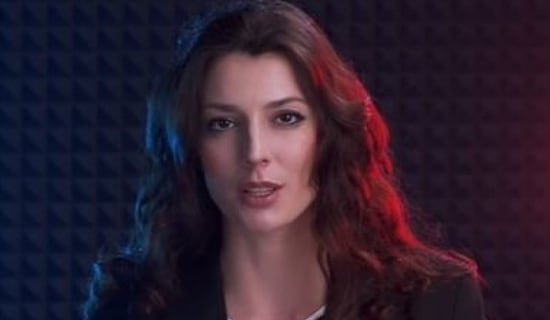The concept of a new "cold war" and a "sanctions war" that has been ongoing between Russia and the U.S. in recent years are hot topics in the Russian mass media, and among experts and the academic community. In an article in the Russian business daily RBC, Victoria Zhuravleva, a professor of history at the Russian State University for the Humanities, analyzes the future of Russia-U.S. relations at the start of the new year.
Zhuravleva notes that Russia clearly rejects a U.S. domination of the "post-bipolar world," despite the evident discrepancy in the "economic weight" of the two countries. She also observes that there is an asymmetry in the two countries' mutual hostility. Whereas in Russia, anti-American sentiment and emphasis on national pride are ingrained in society and are used by the authorities to unite the people, in the U.S. the "Russian card" is used mainly in political infighting.
At the same time, Zhuravleva is seeing first signs of cooperation between the two countries since the Russia-U.S. confrontation of recent years began. Examples, she says, are their cooperation in promoting the nuclear deal with Iran and their joint support for the latest UN resolution on Syria. Nevertheless, she emphasized that these signs definitely do not portend a "reboot" in the relationship.
The following are excerpts from her article:[1]

Victoria Zhuravleva (Image: Russia-direct.org)
Negative Outcomes In Recent Years
"By the end of 2015, Russian-American relations can finally be termed an ongoing confrontation. The deep crisis of confidence is causing problems even in the areas where cooperation is possible (for example, fighting jihadists in Syria). Furthermore, this crisis can cause unintentional international conflicts, even between Russia and the U.S. themselves...
"Within each country's national media, the 'image war' is expanding. Anti-American sentiment in Russia and anti-Russian sentiment in the U.S. have reached their highest level since the collapse of the bipolar system in international relations."
"Emphasis On National Pride Is Widely Supported In Russian Society"
"The crisis in the relationship between the U.S. and post-Soviet Russia is directly connected to the latter's actions in the Crimea and in Eastern Ukraine, which violated the standards of international law. More generally, the crisis is caused by [a general] mismanagement of global and regional processes since the end of the cold war... By its activities in the Ukraine and Syria, Russia has shown its unwillingness to accept the asymmetry in Russian-American relations [that is] based on global U.S. domination... Such an emphasis on national pride is widely supported in Russian society. However, the question is, how long will this consensus hold while the economic crisis deepens and living standards fall within the country...
"The U.S., for its part, will not consider returning to the former status in its relationship with Russia. America believes there is no basis for such ambition on the part of a regional power like Russia, which has a GNP lower than that of Spain...
"As a result, the new formula of Russian-American relations is 'asymmetric confrontation'... At the same time, the media war between the U.S. and Russia has demonstrated that there is a demand for anti-American attitudes in Russia, where authorities are using this 'enemy image' to unite society."
Anti-Americanism And Russophobia
"2015 was marked by a new round of the 'witch-hunt after foreign agents.' The MacArthur Foundation and the American Cultural Center attached to the U.S. Embassy have become new targets. All criticism against Russia and Russian activities is referred to as 'machinations by Washington' - and so are the Ukrainian hostilities, the drop in oil prices, the corruption scandal in FIFA and the charge that Russian track athletes used performance enhancement drugs.
"The enemy is known to all, easy to hate, and opposing him leads to an increase in Russian national self-pride. Moreover, this enemy has problems in his own house: from domestic racial tensions to foreign policy failures such as Iraq, the 'Arab spring,' and Syria... At the same time, Russian national conservatism is contrasted with American universal liberalism. This fundamental difference in values was evident in the speeches of Vladimir Putin and Barak Obama before the UN General Assembly in September. They demonstrated absolutely opposite views on the global situation in general and on the Ukraine and Syria in particular.
"The 'Russian card' is just as intensively used in American politics, especially by Republicans in the current Presidential race. In the new U.S. military doctrine, Russia is called one of the main threats to U.S. national interests, and a revisionist power that is violating the rules of international law..."
Positive Outcomes In Recent Years
"However, 2015 was also noted for a number of positive achievements. Russia and the U.S. were able to work together on the Iranian nuclear agreement, and [the Russian space agency] RosCosmos and NASA agreed to build a new space station after 2024.
"Thanks to the Russian military campaign in Syria, Russia is much less isolated at the end of the year than it was at the beginning of it. Mr. Putin and Mr. Obama were in contact many times during the last few months, and permanent contacts between John Kerry and Sergey Lavrov are continuing. Secretary of State [Kerry] said that the U.S. is not aiming to isolate Russia... and discussed a draft resolution on Syria with Mr. Putin that was adopted three days later by Russia and by the other UN Security Council members. Previous resolutions had been blocked by Russia. Thus, the year 2015 has demonstrated a disparity between public rhetoric and diplomatic practice..."
"Should We Expect A 'Reboot' Of The Relations?"
"Should we expect a 'reboot' of the relations? There are certainly no talks underway about any strategic partnership between the two countries. The U.S. will not build any joint military coalition in Syria with Russia, like the one they had during World War II against Hitler, and it is not going to change its position on the Ukraine. The lifting of sanctions from Russia will depend on whether it keeps the terms of the [February 2015] Minsk II agreement [on Ukraine, signed by Ukraine, Russia, France, and Germany]... However, the normalization we have witnessed in the top-level negotiating process is already a great achievement, even a victory. But the fact that this is the best achievement was can point to clearly demonstrates the depth of the crisis in Russian-American relations at the end of 2015."
Endnotes:
[1] Rbcdaily.ru, January 11, 2016.








